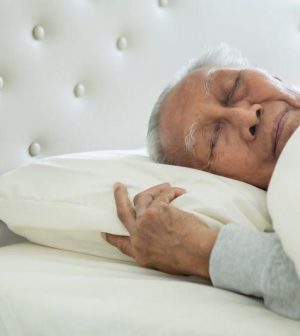- Does the Water in Your House Smell Funny? Here’s Why
- Can a Daily Dose of Apple Cider Vinegar Actually Aid Weight Loss?
- 6 Health Beverages That Can Actually Spike Your Blood Sugar
- Treatment Options for Social Anxiety Disorder
- Understanding the Connection Between Anxiety and Depression
- How Daily Prunes Can Influence Cholesterol and Inflammation
- When to Take B12 for Better Absorption and Energy
- Epsom Salts: Health Benefits and Uses
- See What Saffron Can Do for Sleep and Heart Health
- 6 Common Mistakes to Avoid Before Your Physical
Deep Sleep Might Be a Buffer Against Alzheimer’s-Linked Memory Loss

Getting good sleep is an important part of wellness for many reasons, but new research suggests deep sleep may even guard against memory loss linked to Alzheimer’s.
While disrupted sleep has been linked with accumulating beta-amyloid plaques in the brain faster, scientists found that superior amounts of deep, slow-wave sleep can be protective against memory decline in those with a high burden of Alzheimer’s disease.
This could help ease some of dementia’s most devastating outcomes, the experts said.
“With a certain level of brain pathology, you’re not destined for cognitive symptoms or memory issues,” said study author Zsófia Zavecz, a postdoctoral researcher from the University of California, Berkeley’s Center for Human Sleep Science. “People should be aware that, despite having a certain level of pathology, there are certain lifestyle factors that will help moderate and decrease the effects.
“One of those factors is sleep and, specifically, deep sleep,” Zavecz said in a university news release.
The researchers had previously found that the declining amount of a person’s deep sleep could predict a faster rate of future beta-amyloid buildup in the brain.
That idea of cognitive reserve is a compelling target for sleep researchers, said senior study author Matthew Walker, a UC Berkeley professor of neuroscience and psychology.
“If we believe that sleep is so critical for memory, could sleep be one of those missing pieces in the explanatory puzzle that would tell us exactly why two people with the same amounts of vicious, severe amyloid pathology have very different memory?” Walker said in the release.
While getting more education, being physically active and having a lot of social engagement may also make a person more resilient, some of them are hard to modify.
“If the findings supported the hypothesis, it would be thrilling, because sleep is something we can change,” Walker said. “It is a modifiable factor.”
The study included 62 healthy older adults not diagnosed with dementia from the Berkeley Aging Cohort Study.
They slept in a lab while researchers monitored their sleep waves with an electroencephalography (EEG) machine. The team then used a positron emission tomography (PET) scan to measure the amount of beta-amyloid deposits in the participants’ brains. While half of the participants had high amounts of amyloid deposits, the other half did not.
The participants then completed a memory task involving matching names to faces.
Those with high amounts of beta-amyloid deposits in their brain who also had more deep sleep did better on the memory test than those with the same amount of deposits who slept worse. This was limited to the group with amyloid deposits. In the group without the deposits, deep sleep did not improve memory.
After controlling for other factors, researchers still saw benefits from deep sleep. This suggests that deep sleep contributes to salvaging memory function even in the face of brain pathology.
The findings were published May 3 in the journal BMC Medicine.
Walker suggested deep sleep could be like a rescue effort.
“Think of deep sleep almost like a life raft that keeps memory afloat, rather than memory getting dragged down by the weight of Alzheimer’s disease pathology,” Walker said. “It now seems that deep NREM sleep may be a new, missing piece in the explanatory puzzle of cognitive reserve. This is especially exciting because we can do something about it. There are ways we can improve sleep, even in older adults.”
More information
The U.S. National Institutes of Health has more on Alzheimer’s disease.
SOURCE: University of California, Berkeley, news release, May 3, 2023
Source: HealthDay
Copyright © 2026 HealthDay. All rights reserved.










